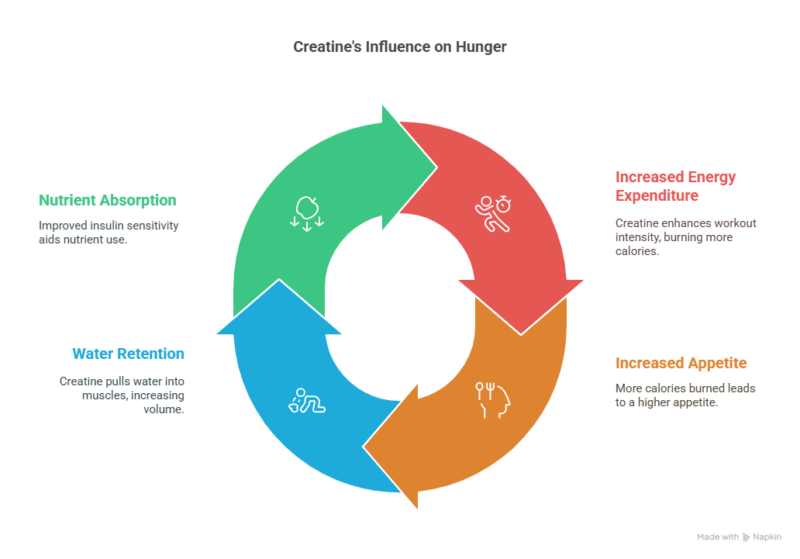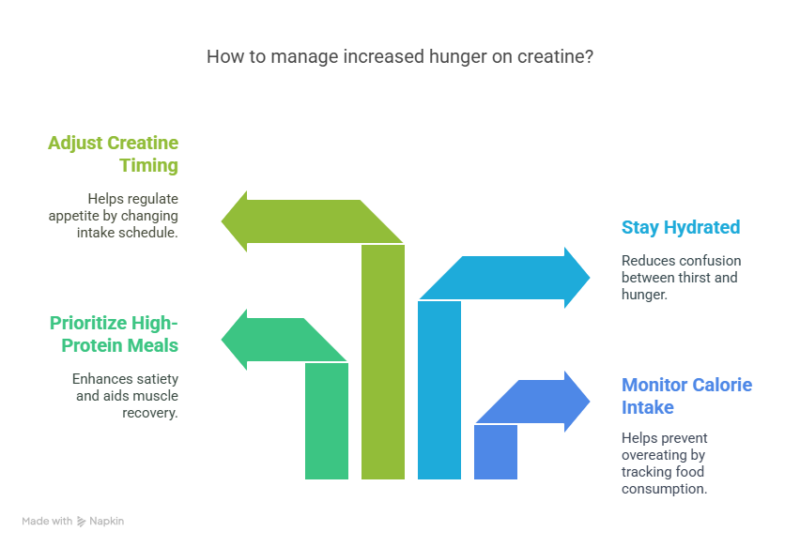You’ve probably heard all sorts of things about creatine. Some people say it’s the best thing for muscle growth, others claim it causes bloating, and then there’s that one guy at the gym who swears it makes him “crazy hungry” all the time. But is that actually true?
Short answer: Creatine itself doesn’t directly make you hungry.
However, it can influence appetite in indirect ways—like through increased energy demands, changes in hydration, and even shifts in metabolism. So if you’re feeling hungrier than usual while taking creatine, there’s a good reason for it.
Does Creatine Directly Increase Hunger?
Short answer: Not really. At least, not in the way people think.
But here’s where it gets interesting—while creatine doesn’t directly make you hungrier, it can create changes in your body that might lead to an increased appetite.
How Could Creatine Affect Hunger?

Below are a few possibilities supported by science.
1. Increased Energy Expenditure
Creatine allows muscles to work harder for longer periods, which could lead to more calories burned during workouts. If someone is training more intensely, their body may naturally demand more food to compensate.
Key Point: Higher training intensity = more energy burned = increased appetite.
2. Water Retention and Cellular Hydration
Creatine pulls water into muscle cells, increasing hydration and muscle volume. While this doesn’t directly cause hunger, some people might confuse better muscle hydration with increased appetite.
Key Point: Better hydration can sometimes feel like increased hunger.
3. Insulin Sensitivity and Nutrient Absorption
Creatine has been linked to improved insulin sensitivity. Better insulin function means that nutrients are absorbed and utilized more efficiently. In some cases, improved insulin sensitivity could lead to changes in hunger levels.
Key Point: More efficient nutrient use might lead to different hunger signals.
Why Some People Feel Hungrier on Creatine
Even though creatine doesn’t technically cause hunger, plenty of people swear that they feel hungrier when they start taking it. That’s not just in their heads—there are a few possible reasons why this happens.
1. Increased Energy Output
Creatine helps with strength and performance. If you’re suddenly lifting heavier, pushing yourself harder, and squeezing out more reps, you’re burning more energy. That naturally leads to a higher calorie demand, which means your body might start signaling that it needs more food.
Think about it—if you start training harder and moving more throughout the day, your metabolism speeds up. The result? More hunger.
2. Muscle Growth and Recovery
Building muscle requires energy. When your body repairs and grows muscle tissue, it requires fuel, and that often leads to an increase in appetite. Since creatine supports muscle recovery, it’s possible that people notice they feel hungrier simply because their body is demanding more nutrients for the rebuilding process.
3. Increased Water Retention
Creatine pulls water into muscle cells, which is part of why muscles look fuller and more pumped when using it. Some people mistake this water retention for bloating, which can sometimes make you feel like you need to eat more.
On the flip side, drinking more water (which is recommended when taking creatine) can sometimes lead to an increased appetite in certain individuals, especially if they confuse thirst with hunger.
4. Psychological Factors
Sometimes, the expectation of hunger can actually cause hunger. If someone hears that creatine makes people hungrier, they might subconsciously pay more attention to their appetite and assume they’re eating more than usual—even if they aren’t.
Additionally, people who start supplementing with creatine often pair it with a more intense workout routine. If someone is training harder and tracking their food intake more closely, it’s easy to see how hunger levels might shift simply due to changes in lifestyle.
Who Might Experience Increased Hunger on Creatine?
Not everyone feels hungrier when taking creatine, but certain groups might be more likely to notice changes.
| Group | Likelihood of Increased Hunger | Reason |
| Athletes & Bodybuilders | High | Increased training intensity and energy expenditure. |
| People in Caloric Surplus | Medium | Creatine might make it easier to eat more while bulking. |
| Those with High Insulin Sensitivity | Low to Medium | Could affect nutrient absorption, but evidence is unclear. |
| Casual Gym-Goers | Low | Less drastic changes in training intensity and metabolism. |
If hunger levels change while taking creatine, the best approach is to track training intensity, hydration, and diet to see what might be driving the shift.
Should You Be Concerned About Increased Hunger on Creatine?

In fact, it could be a sign that your body is responding well to increased energy demands.
- Monitor calorie intake – Track meals to ensure hunger isn’t leading to overeating.
- Prioritize high-protein meals – Protein helps with satiety and muscle recovery.
- Stay hydrated – Sometimes thirst is mistaken for hunger, especially with creatine pulling water into muscles.
- Adjust creatine timing – Some people find that taking creatine with meals instead of on an empty stomach helps regulate appetite.
My Personal Experience
I’ve been using creatine for years, and honestly, my hunger levels didn’t change dramatically when I first started. But after a few weeks, I did notice that on days when I trained harder, I was eating more. At first, I thought creatine itself was making me hungrier, but when I really paid attention, it became clear that I was just burning more calories.
Some of my gym buddies had similar experiences, while others didn’t feel any change at all. One guy swore that creatine turned him into a food-obsessed maniac, while another didn’t even notice a difference in his appetite.
What this tells me is that hunger changes while using creatine probably have more to do with individual factors—training style, metabolism, hydration, and overall diet—rather than creatine itself.

